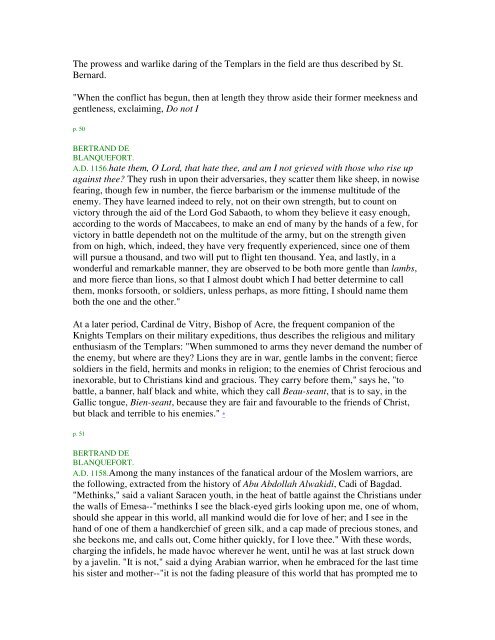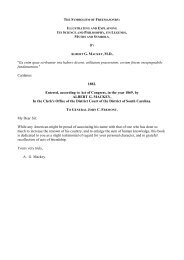The History of the Knights Templar by Charles G ... - Masonic Renewal
The History of the Knights Templar by Charles G ... - Masonic Renewal
The History of the Knights Templar by Charles G ... - Masonic Renewal
Create successful ePaper yourself
Turn your PDF publications into a flip-book with our unique Google optimized e-Paper software.
<strong>The</strong> prowess and warlike daring <strong>of</strong> <strong>the</strong> <strong>Templar</strong>s in <strong>the</strong> field are thus described <strong>by</strong> St.<br />
Bernard.<br />
"When <strong>the</strong> conflict has begun, <strong>the</strong>n at length <strong>the</strong>y throw aside <strong>the</strong>ir former meekness and<br />
gentleness, exclaiming, Do not I<br />
p. 50<br />
BERTRAND DE<br />
BLANQUEFORT.<br />
A.D. 1156.hate <strong>the</strong>m, O Lord, that hate <strong>the</strong>e, and am I not grieved with those who rise up<br />
against <strong>the</strong>e? <strong>The</strong>y rush in upon <strong>the</strong>ir adversaries, <strong>the</strong>y scatter <strong>the</strong>m like sheep, in nowise<br />
fearing, though few in number, <strong>the</strong> fierce barbarism or <strong>the</strong> immense multitude <strong>of</strong> <strong>the</strong><br />
enemy. <strong>The</strong>y have learned indeed to rely, not on <strong>the</strong>ir own strength, but to count on<br />
victory through <strong>the</strong> aid <strong>of</strong> <strong>the</strong> Lord God Sabaoth, to whom <strong>the</strong>y believe it easy enough,<br />
according to <strong>the</strong> words <strong>of</strong> Maccabees, to make an end <strong>of</strong> many <strong>by</strong> <strong>the</strong> hands <strong>of</strong> a few, for<br />
victory in battle dependeth not on <strong>the</strong> multitude <strong>of</strong> <strong>the</strong> army, but on <strong>the</strong> strength given<br />
from on high, which, indeed, <strong>the</strong>y have very frequently experienced, since one <strong>of</strong> <strong>the</strong>m<br />
will pursue a thousand, and two will put to flight ten thousand. Yea, and lastly, in a<br />
wonderful and remarkable manner, <strong>the</strong>y are observed to be both more gentle than lambs,<br />
and more fierce than lions, so that I almost doubt which I had better determine to call<br />
<strong>the</strong>m, monks forsooth, or soldiers, unless perhaps, as more fitting, I should name <strong>the</strong>m<br />
both <strong>the</strong> one and <strong>the</strong> o<strong>the</strong>r."<br />
At a later period, Cardinal de Vitry, Bishop <strong>of</strong> Acre, <strong>the</strong> frequent companion <strong>of</strong> <strong>the</strong><br />
<strong>Knights</strong> <strong>Templar</strong>s on <strong>the</strong>ir military expeditions, thus describes <strong>the</strong> religious and military<br />
enthusiasm <strong>of</strong> <strong>the</strong> <strong>Templar</strong>s: "When summoned to arms <strong>the</strong>y never demand <strong>the</strong> number <strong>of</strong><br />
<strong>the</strong> enemy, but where are <strong>the</strong>y? Lions <strong>the</strong>y are in war, gentle lambs in <strong>the</strong> convent; fierce<br />
soldiers in <strong>the</strong> field, hermits and monks in religion; to <strong>the</strong> enemies <strong>of</strong> Christ ferocious and<br />
inexorable, but to Christians kind and gracious. <strong>The</strong>y carry before <strong>the</strong>m," says he, "to<br />
battle, a banner, half black and white, which <strong>the</strong>y call Beau-seant, that is to say, in <strong>the</strong><br />
Gallic tongue, Bien-seant, because <strong>the</strong>y are fair and favourable to <strong>the</strong> friends <strong>of</strong> Christ,<br />
but black and terrible to his enemies." *<br />
p. 51<br />
BERTRAND DE<br />
BLANQUEFORT.<br />
A.D. 1158.Among <strong>the</strong> many instances <strong>of</strong> <strong>the</strong> fanatical ardour <strong>of</strong> <strong>the</strong> Moslem warriors, are<br />
<strong>the</strong> following, extracted from <strong>the</strong> history <strong>of</strong> Abu Abdollah Alwakidi, Cadi <strong>of</strong> Bagdad.<br />
"Methinks," said a valiant Saracen youth, in <strong>the</strong> heat <strong>of</strong> battle against <strong>the</strong> Christians under<br />
<strong>the</strong> walls <strong>of</strong> Emesa--"methinks I see <strong>the</strong> black-eyed girls looking upon me, one <strong>of</strong> whom,<br />
should she appear in this world, all mankind would die for love <strong>of</strong> her; and I see in <strong>the</strong><br />
hand <strong>of</strong> one <strong>of</strong> <strong>the</strong>m a handkerchief <strong>of</strong> green silk, and a cap made <strong>of</strong> precious stones, and<br />
she beckons me, and calls out, Come hi<strong>the</strong>r quickly, for I love <strong>the</strong>e." With <strong>the</strong>se words,<br />
charging <strong>the</strong> infidels, he made havoc wherever he went, until he was at last struck down<br />
<strong>by</strong> a javelin. "It is not," said a dying Arabian warrior, when he embraced for <strong>the</strong> last time<br />
his sister and mo<strong>the</strong>r--"it is not <strong>the</strong> fading pleasure <strong>of</strong> this world that has prompted me to



